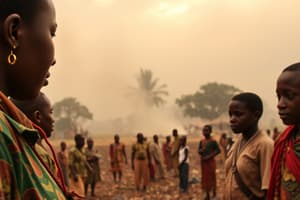Podcast
Questions and Answers
Qatar and Bahrain became independent sovereign states in _____
Qatar and Bahrain became independent sovereign states in _____
1971
The European presence in Algeria began in _____
The European presence in Algeria began in _____
1830
The first country in North Africa to gain independence was _____ in 1951.
The first country in North Africa to gain independence was _____ in 1951.
Libya
The nationalist movement in Morocco was known as _____
The nationalist movement in Morocco was known as _____
Sultan Mohammed V became a symbol of _____ for Morocco.
Sultan Mohammed V became a symbol of _____ for Morocco.
A major trigger for decolonization was the weakness of the ______.
A major trigger for decolonization was the weakness of the ______.
The post-World War II era saw a new international ______ that facilitated decolonization.
The post-World War II era saw a new international ______ that facilitated decolonization.
The two new superpowers, ______ and the USSR, supported the decolonization process.
The two new superpowers, ______ and the USSR, supported the decolonization process.
The Charter of the United Nations recognized the right of self-______.
The Charter of the United Nations recognized the right of self-______.
Critical voices against the colonial model arose from the ______.
Critical voices against the colonial model arose from the ______.
Flashcards are hidden until you start studying
Study Notes
Causes of Decolonization
- The weakness of the metropolis, such as the high cost of administration and defense.
- The favorable international context, such as the emergence of the US and USSR as superpowers.
- The strength of nationalist movements, inspired by the Soviet Revolution and the UN's recognition of self-determination.
Decolonization in the Maghreb
- Follows a similar process to the Middle East.
- North African territories were separated from the Ottoman Empire early, and European presence grew in the 20th Century.
- After WWII, Libya gained independence in 1951, followed by Morocco and Tunisia in 1956.
- Algeria experienced the longest and toughest process of decolonization, with a fight for independence and the establishment of socialist and Islamic bases in the socio-political structure of the country.
Morocco
- Nationalist movements opposed French domination.
- Mohammed V became a symbol of freedom after being exiled.
- Morocco gained independence in 1956 after French defeat in Indochina and criticism from the Bandung Conference.
- Still has a questionable human rights record under its monarchy.
Libya
- Allies disagreed on the future of the former Italian colony after WWII.
- The UN granted independence to Libya, leaving it in the hands of King Idris.
- Colonel Gaddafi seized power in 1969.
- Libya’s economy is largely oil-based, with significant nationalization under Gaddafi.
Tunisia
- Became a French protectorate in 1881.
- Habib Bourguiba gained power and influence, leading to independence in 1956.
- Experienced a monarchical regime briefly before establishing a republic.
- General Zine El Abidine Ben Ali ruled from 1987 until the Arab Spring upheavals in 2011.
Algeria
- Faced the longest and toughest decolonization process with a violent struggle for independence.
- The FLN (National Liberation Front) led the fight against France.
- General de Gaulle eventually recognized Algeria's right to self-determination.
- After gaining independence in 1962, Algeria experienced various governments, including those of Ben Bella and Boumedienne.
Decolonization in the Middle East
- The League of Arab States was established in 1945, but it wasn't politically effective.
- The Egyptian revolution of 1952 (establishing a republic in 1953) and Nasser becoming president in 1954 encouraged anti-Western nationalism throughout the Arab world.
- The region was divided into pro-Western countries with conservative regimes and populist and socialist movements advocating for independence and historical identity.
Studying That Suits You
Use AI to generate personalized quizzes and flashcards to suit your learning preferences.





